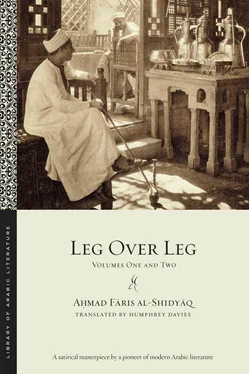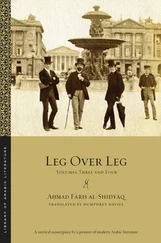Looking at al-Shidyāq’s complete work, however, helps scholars to re-evaluate this assessment, to engage critically with the Nahḍah and its output, to understand the importance of both translation and philology to modern Arabic literature, and to reconceptualize global frameworks of literature and Arabic’s place in them. As al-Shidyāq writes, he is no “chain-man” and does not seek to replicate the style of those authors who have come before him. Yet he has as much distaste for appearing at the front of the chain as he does for appearing at its rear. For this reason, Leg over Leg can be seen as a portrait in miniature of Arabic literary modernity, if we understand that modernity as it has been described more recently in scholarship: a contested category marked by self-interrogation and a “constant reworking of the meaning of community” through language, created not by being imported from the West, but through interaction with Europe. 6Historically contingent rather than inevitable and ambivalent in its relationship to both universalist claims and Eurocentric enunciations, Arabic modernity in Leg over Leg appears not as a stage on a single linear trajectory of history but as the name given to all of the competing “discrepant histories” which are themselves intertwined. 7
Engaged with both the literary heritage of the past and the social and political conditions of the present, written in conversation with European languages and literature, and following the path of a burgeoning print industry, Leg over Leg is a portrait of a world where material and literary culture are in simultaneous flux. As al-Shidyāq writes:
I tell you, the world in your late grandfather’s and father’s day was not as it is now. In their day, there were no steamboats or railway tracks to bring close far-off tracts and create new pacts , to connect the disconnected , and make accessible what was once protected . Then, one didn’t have to learn many languages. It could be said of anyone who knew a few words of Turkish — Welcome, my lord! How nice to see you, my lord! — that he’d make a fine interpreter at the Imperial court. (1855 4.1.9)
The “new age” [ al-ʿaṣr al-jadīd ], the subject of many Nahḍah -era writings, was one in which the disconnected were being rapidly and frequently connected — through technologies of travel, of course, as well as through imperialist military expansion, missionary activities, and trade. Yet as al-Shidyāq hints here, these connections were formed as much by the production of knowledge and literature as they were by material innovations. Languages, translation, and even print culture — as printing presses gradually replaced the scriptoria of the imperial court — are what draw distant places closer in Leg over Leg , as it follows its protagonist from his native Lebanon to Malta, Egypt, Tunisia, France, and England, while he searches for gainful employment in the literary sphere, as a scribe, then poet, translator, editor, and author.

Leg over Leg is not only emblematic of his age; it is also largely autobiographical and, in this sense, irreducibly idiosyncratic. Al-Shidyāq followed the same peregrinations as his protagonist, whose name, al-Fāriyāq (or “the Fāriyāq,” as he retains the definite article from his family name), is a condensation of his given and last names. 8In the absence of consistent historical records, biographers have even gone so far as to use Leg over Leg as a historical document, although this practice — considering the text’s satirical and highly stylized mode of narration — seems to obscure more than it illuminates. 9It cannot, for example, help settle the question of al-Shidyāq’s birth date (which is variously given as 1801, 1804, or 1805), as the Fāriyāq is only specified as being “born with the misfortune of having misfortune in the ascendant everywhere, the Scorpion raising its tail to strike at the Kid, or Billy Goat, and the Crab set on a collision course with the horn of the Ox” (1.1.13). What is known is that Fāris al-Shidyāq was probably born in the village of Ashqūt, in what is now Lebanon, to a prominent family in the Maronite community. Like many in his family, which had for generations provided clerks, teachers, and secretaries for local emirs and their sons, al-Shidyāq entered the local village school in Ḥadath, where the family later moved. An intelligent child of a literary family, he learned in large part at home and afterward took up the family profession as copyist and instructor in the service of the emir Ḥaydar al-Shihābī and helped him to compile his family chronicle and history of Lebanon, Al-Ghurar al-ḥisān fī tārīkh ḥawādith al-zamān .
Al-Shidyāq might have kept to this well-trodden path had he not come into contact with some of those forces that “connect the disconnected.” In 1825 his older brother Asʿad began working as an Arabic instructor and translator for two American evangelical missionaries in Beirut and eventually converted to Protestantism and declared his desire to interpret the Gospel independently and preach it to others. Distraught and probably fearful of the social and financial repercussions of his leaving the church, his family begged him to renounce his new faith and his vocal skepticism of what he called their “custom and upbringing”; when he did not, he was taken into Patriarchal custody. 10In the Qannūbīn monastery in Mount Lebanon, whether from torture or poor living conditions — he was kept for some time in a small cell that was blocked entirely by earth and stone except for a small window through which rations were passed to him — Asʿad died in 1830. 11In the meantime Fāris al-Shidyāq — who “anticipated trouble,” according to a missionary account of Asʿad’s case, but possibly also out of disgust for the general approbation among the elites in his community for his brother’s punishment — fled with several of the Americans to Alexandria and then British-protected Malta, where he entered their employ. 12
This would mark al-Shidyāq’s exile from Lebanon and the beginning of his lifetime of wandering, as he would return only once, in 1840, to visit his family in secret. He stayed in Malta from early 1827 to 1828 and again from 1834 to 1848, working primarily for the London-based Church Missionary Society (CMS). At first, he was employed as a tutor in Arabic for several of the missionaries, but they soon recognized the full extent of his abilities and enlisted him in their most precious and frustrating project — their Arabic printing press, which they hoped would produce translations of religious materials but was stalled by the lack of printing materials and qualified personnel. Al-Shidyāq soon began translating texts, as well as editing and correcting others’ translations; as Jurjī Zaydān remarks in the biographical entry for al-Shidyāq in his A History of Arabic-Language Literature , “he was responsible, as the author, translator, or editor, for every single Arabic book printed at the Malta press” during his tenure there. 13Zaydān’s description, as later scholars have pointed out, is probably an exaggeration — there were other translators employed by the press, and the missionaries themselves took an active role in the production of literary materials. But it is nonetheless clear that al-Shidyāq became essential to the operations of the press, as the missionaries found him indispensable, despite the fact that he remained unconvinced of the truth of Protestant Christianity and the validity of the missionary project as a whole.
Upon his arrival, as his supervisor notes, al-Shidyāq was “very much in need of a sound knowledge of the truth of the Gospel, and… gives good hope of receiving it.” 14But if they hoped that they would find him to be like his brother, open to evangelical teachings and eager to join the missionary ranks himself, then they were deeply disappointed. Al-Shidyāq maintained a steadfast skepticism in matters ecclesiastical, which is evident in his sometimes ambivalent adoption of Protestantism. 15As one of the American missionaries writes, “Fares has always expressed a wish to be free, and loudly sometimes.” 16Yet he was also the most qualified and learned of any of those they could find to work with them; he “probes things to the very bottom,” as his supervisor wrote of him, an often vexing quality — as it meant long sessions of debate (as the same missionary also wrote, “were it not for his disputing I scarcely knew labours more pleasant to me than those I perform with him”) — but one that was ultimately beneficial. 17Al-Shidyāq translated religious tracts, secular educational materials, and grammars for the CMS and was often the only translator in their employ.
Читать дальше













